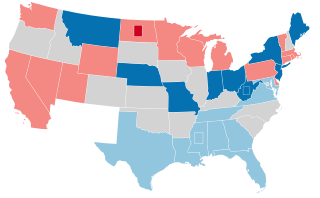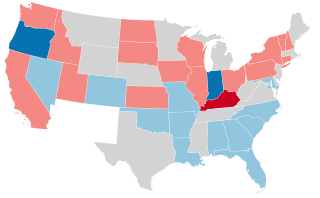| |||||||||||
| |||||||||||
The 1907 United States Senate elections in Oklahoma were the inaugural U.S. Senate elections for the new state of Oklahoma. The Oklahoma Legislature elected Robert L. Owen and Thomas Gore.
| |||||||||||
| |||||||||||
The 1907 United States Senate elections in Oklahoma were the inaugural U.S. Senate elections for the new state of Oklahoma. The Oklahoma Legislature elected Robert L. Owen and Thomas Gore.
| State | Incumbent | Results [1] | Candidates | ||
|---|---|---|---|---|---|
| Senator | Party | Electoral history | |||
| Oklahoma (Class 2) | New state | First senator elected December 10, 1907. Democratic gain. |
| ||
| Oklahoma (Class 3) | First senator elected December 10, 1907. Democratic gain. |
| |||

The 1912–13 United States Senate elections were held on various dates in various states. They were the last U.S. Senate elections before the ratification of the Seventeenth Amendment in 1913, establishing direct elections for all Senate seats. Senators had been primarily chosen by state legislatures. Senators were elected over a wide range of time throughout 1912 and 1913, and a seat may have been filled months late or remained vacant due to legislative deadlock. Some states elected their senators directly even before passage of Seventeenth Amendment. Oregon pioneered direct election and experimented with different measures over several years until it succeeded in 1907. Soon after, Nebraska followed suit and laid the foundation for other states to adopt measures reflecting the people's will. By 1912, as many as 29 states elected senators either as nominees of their party's primary or in conjunction with a general election.

The 1910–11 United States Senate election were held on various dates in various states. As these U.S. Senate elections were prior to the ratification of the Seventeenth Amendment in 1913, senators were primarily chosen by state legislatures. Senators were elected over a wide range of time throughout 1910 and 1911, and a seat may have been filled months late or remained vacant due to legislative deadlock. However, some states had already begun direct elections during this time. Oregon pioneered direct election and experimented with different measures over several years until it succeeded in 1907. Soon after, Nebraska followed suit and laid the foundation for other states to adopt measures reflecting the people's will. By 1912, as many as 29 states elected senators either as nominees of their party's primary or in conjunction with a general election.

The 1908–09 United States Senate elections were held on various dates in various states. As these U.S. Senate elections were prior to the ratification of the Seventeenth Amendment in 1913, senators were primarily chosen by state legislatures. Senators were elected over a wide range of time throughout 1906 and 1907, and a seat may have been filled months late or remained vacant due to legislative deadlock. However, some states had already begun direct elections during this time. Oregon pioneered direct election and experimented with different measures over several years until it succeeded in 1907. Soon after, Nebraska followed suit and laid the foundation for other states to adopt measures reflecting the people's will. By 1912, as many as 29 states elected senators either as nominees of their party's primary or in conjunction with a general election.

The Oklahoma House of Representatives is the lower house of the legislature of the U.S. state of Oklahoma. Its members introduce and vote on bills and resolutions, provide legislative oversight for state agencies, and help to craft the state's budget. The upper house of the Oklahoma Legislature is the Oklahoma Senate.

The politics of Oklahoma exists in a framework of a presidential republic modeled after the United States. The governor of Oklahoma is both head of state and head of government, and of a pluriform two-party system. Executive power is exercised by the governor and the government. Legislative power is vested in the governor and the bicameral Oklahoma Legislature. Judicial power is vested in the judiciary of Oklahoma. The political system is laid out in the 1907 Oklahoma Constitution.

The 1909 South Carolina United States Senate election was held on January 26, 1909. Its outcome was determined by a Democratic Party primary election held on August 25 and September 8, 1908. Interim Senator Frank B. Gary, who had been elected to complete the unfinished term of the late Senator Asbury Latimer, did not run for re-election. Democrat Ellison D. Smith won the Democratic primary and was elected by the General Assembly for a six-year term.

The 1906–07 United States Senate elections were held on various dates in various states. As these U.S. Senate elections were prior to the ratification of the Seventeenth Amendment in 1913, senators were chosen by state legislatures. Senators were elected over a wide range of time throughout 1906 and 1907, and a seat may have been filled months late or remained vacant due to legislative deadlock. In these elections, terms were up for the senators in Class 2.

The 1908 United States elections elected the members of the 61st United States Congress, occurring during the Fourth Party System. Oklahoma joined the union during the 61st Congress. Despite the Panic of 1907, Republicans continued to control the presidency and both houses of Congress.

The 1942 United States Senate election in Oklahoma took place on November 3, 1942. Incumbent Democratic Senator Joshua B. Lee ran for re-election to a second consecutive term. After winning the Democratic primary against several strong opponents, Lee advanced to the general election, where he was originally set to face former Republican Senator William B. Pine. However, shortly after winning the Republican primary, Pine died; the state Republican Party tapped businessman Edward H. Moore as its replacement nominee. In a favorable Republican environment, Moore defeated Lee by a wide margin to win his first and only term in the U.S. Senate.

The 1924 United States Senate election in Oklahoma took place on November 4, 1924. Incumbent Democratic Senator Robert Latham Owen declined to run for re-election. In a crowded Democratic primary, impeached former Governor Jack C. Walton won the party's nomination with a narrow plurality. In the general election, he faced businessman William B. Pine, the Republican nominee. Though Democratic presidential nominee John W. Davis narrowly won the state over President Calvin Coolidge, Walton's unpopularity and controversy caused Democrats to lose the seat; Pine defeated Walton in a landslide.

The 1908 Oklahoma elections were held on November 3, 1908, in the U.S. State of Oklahoma. Oklahoma voters participated in the 1908 United States presidential election and the 1908 United States House of Representatives elections. Elections also took place for the Oklahoma Corporation Commission and Oklahoma Supreme Court; the first five state questions all failed to gain voter approval.